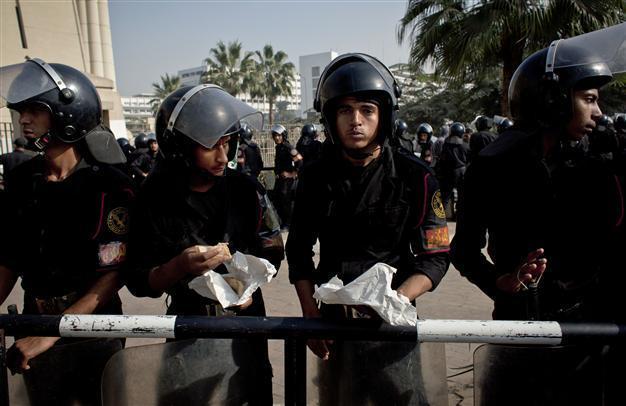Egypt opposition to march on presidential palace
CAIRO - Agence France-Presse

Riot policemen eat their lunch as they stand guard in front of Egypt?s top court during a protest for supporters of Egyptian President Mohammed Morsi, unseen, in Cairo, Egypt, Monday, Dec. 3, 2012. AP photo
Opponents of Islamist President Mohamed Morsi were to march on the presidential palace on Tuesday to protest his power grab and a controversial draft charter, as the country plunged deeper into crisis.
Five marches were set to take off at 4:00 pm (1400 GMT) from several mosques in Cairo towards the Itihadiya presidential palace in the upscale neighbourhood of Heliopolis, organisers said.
Security measures have been tightened around the capital, with some schools and businesses closing early for the day.
A November 22 decree issued by Morsi expanding his powers and enabling him to put to a December 15 referendum a draft constitution -- rejected by liberals, leftists and Christians -- has sparked strikes and deadly protests.
Independent and opposition newspapers refused to publish their Tuesday editions in protest at the lack of press freedom in the constitution.
The move was in order to "stand up to tyranny," independent daily Al-Tahrir said on its website.
"The Egyptian Independent objects to continued restrictions on media liberties, especially after hundreds of Egyptians gave their lives for freedom," read a message on that newspaper's website, its only viewable content on Tuesday morning.
Daily Al-Masry Al-Youm said the papers were "protesting against the articles on the press in the draft constitution... and reject (Morsi's) November 22 decree." As he faces his worst crisis since taking office in June, Morsi insists the measures are aimed at ending a tumultuous transition following the popular uprising that toppled Hosni Mubarak in 2011.
But his opponents have accused him of choosing the same path of autocracy that finally cost Mubarak his presidency.
Morsi's decree not only placed his decisions beyond judicial oversight but also barred any judicial body from dissolving the Islamist-dominated panel that drafted and approved the new constitution, sparking a conflict with the country's judges.
The constitution has become the focal point of a political and ideological battle in Egypt between Islamists who support Morsi and the largely secular-leaning opposition.
The charter has been criticised for failing to protect key rights and for paving the way to a strict interpretation of Islamic law.
Leading dissident and former Arab League chief Amr Mussa, who walked out of the constitution panel, said the charter did not reflect the freedoms that should be guaranteed in the 21st century.
"The document has to be something that makes life easier for Egyptians... not something that requires difficult interpretations, which scares people," Mussa told reporters. "We are in the 21st century." The decision to go to a referendum on December 15 caused further upheaval, including within the judiciary itself.
On Monday, top judges said they would ensure judicial supervision of the referendum, despite calls for a boycott by some of their colleagues.
The decision by the Supreme Judicial Council marked a boost for Morsi and dashed opposition hopes of stripping the referendum and the constitution of their legitimacy.
Analysts said the decision by the Supreme Judicial Council indicated a rift within the judiciary but there are likely to be enough officials to monitor the voting.
"Maybe there will not be one judge for every ballot box, but perhaps one judge for every polling booth," said Mustapha Kamel al-Sayyed, a political science lecturer at Cairo university.
Tuesday's march to the presidential palace is the latest in a string of protests which the opposition said could escalate.
"We will see what measures to take, which could include calls for civil disobedience and strikes should Morsi not back down on his decree and the vote go ahead," Tareq al-Khuli of the opposition April 6 movement told AFP on the eve of the marches.
In Cairo's iconic Tahrir Square, hundreds of protesters have been camping out since Morsi issued his decree.
